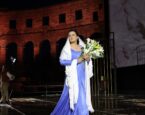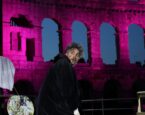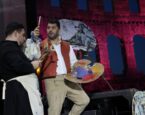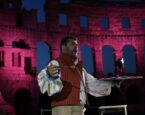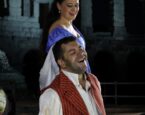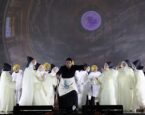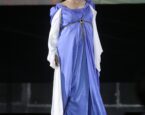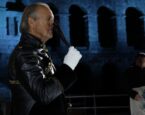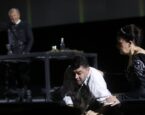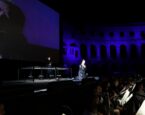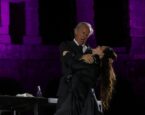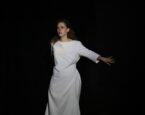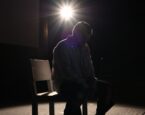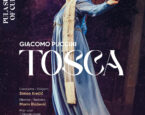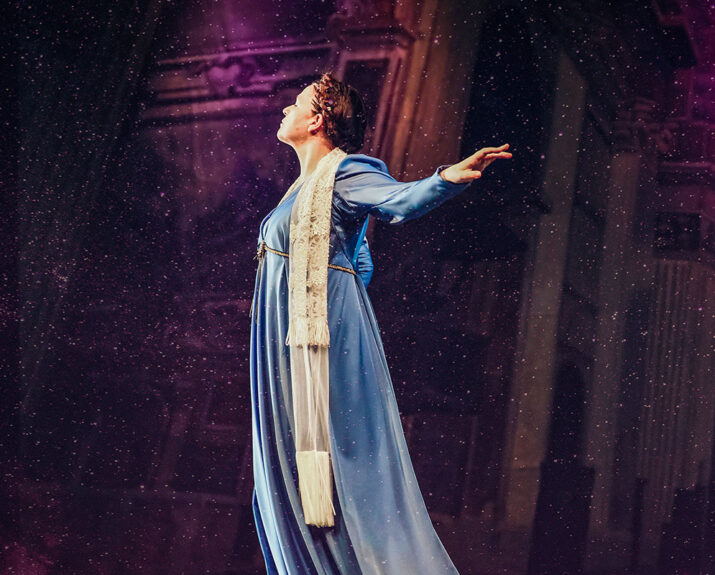
TOSCAGiacomo Puccini
Riječki simfonijski orkestar
Riječki operni zbor
On July 26, the Arena Pula will turn into the scene of Giacomo Puccini’s opera “Tosca”, the performance of which starts at 9 p.m., as part of the Pula Summer of Culture. Conducted by maestro Simon Krečič and directed by Marin Blažević, this performance of “Tosca” is a play in three acts. The audience sees three different ways of its possible staging: from operatic historicism, in which visuality rests on the beauty of theatrical painting and “authentic” costumes, through the actualization of the opera story to opera direction reduced to the essentials: music, drama, voice, acting, performer’s personality and the intensity of the experience.
The famous German soprano, honorary member of the Rijeka Opera, Maida Hundeling, will perform in the title role of the performance in the Arena Pula. Alongside her, the role of Cavaradossi will be played by tenor Ivan Momirov, who has performed on opera stages in the world’s leading opera houses. The role of Scarpia will be played by another world-class soloist, Giorgio Surian, who became famous with this role on many stages of the opera world. The Rijeka Symphony Orchestra and the Choir of the Croatian National Opera and Ballet Theater Ivan pl. Zajc will also take part in the performance. The costume design is by Sandra Dekanić, and the scenography is co-signed by Marin Blažević with Alan Vukelić, as well as the lighting with Dalibor Fugošić.
“Tosca” is an intense story full of strong emotions, a vortex in which political intrigues, escape and pursuit, jealousy, betrayal, fatal lust, immoral offer, but above all – faith in art, love and freedom intertwine. The great love of the opera diva Florija Tosca and the revolutionary painter Cavaradossi is confronted with the principles of political and moral convictions. It is the decisive conflict of society and one woman, convinced that life should be devoted to love and art.
The performance lasts about three hours, with two breaks.
ACT I
Angelotti, a political prisoner who has escaped from Castel Sant’Angelo, rushes into the Roman Church of Sant’Andrea della Valle and hides in a side chapel. The painter Mario Cavaradossi works there on the altar painting of Mary Magdalene. Observing the blue eyes on the portrait he compares them to Tosca’s dark eyes and sings a hymn to her beauty, causing thus the indignation of the pious sacristan. When Angelotti sneaks out from the chapel, Cavaradossi recognises him and promises help. They are interrupted by the voice of Mario’s lover, Floria Tosca, who jealously asks whose voice was it that she also heard, reminding him of their rendezvous that evening. Tosca recognises the beautiful Marchesa Attavanti in the altar portrait of Magdalene and accuses Mario of being unfaithful, however, he manages to assure her of his love. She leaves.
When Angelotti comes out of his hiding, a cannon from Castel Sant’Angelo signals that his escape has been discovered. He and Cavaradossi flee to the painter’s house. The sacristan returns joyfully to the church announcing that Napoleon has finally been defeated in Italy, thus the Te Deum is prepared, while in the evening a cantata will be sung with the famous Floria Tosca.
The general excitement is cut short by the entrance of Scarpia, chief of police, who, accompanied by his henchman Spoletta, orders that the church and its surroundings be searched. He finds a trace of Angelotti in the chapel, namely the lady’s fan that his sister, the Marchesa Attavanti, has lost. When Tosca returns looking for Mario, Scarpia shows her the fan. This confirms Tosca’s suspicions about Mario’s infidelity, and she runs off in a rage. Scarpia orders his men to have her followed. A Te Deum begins in the church celebrating the victory against Napoleon.
ACT II
Scarpia has dinner in Palazzo Farnese, thinking of having Tosca in his power now. Spoletta has not found Angelotti in Cavaradossi’s villa, but he brings the painter. Cavaradossi protests because of his arrest and denies having anything to do with Angelotti’s escape. Scarpia interrogates the painter. Mario is enchanted by Tosca’s singing that can be heard. She appears just as Mario is being taken to another room to be tortured. Tosca is frightened by Scarpia’s questions and reveals Angelotti’s hiding place, namely, the well of Cavaradossi’s garden. The hardly conscious painter angrily confronts Tosca.
The officer Sciarrone announces to Scarpia that Napoleon has won at Marengo after all, having defeated their troops. Cavaradossi defiantly sings a revolutionary song. Scarpia arrests him now as guilty of high treason and orders him to be executed. Scarpia suggests to Tosca that he will let Cavaradossi go free if she gives herself to him. Fighting the violent Scarpia off, Tosca declares she has dedicated her life to art and love. Angelotti has been found in the villa, but he committed suicide before his arrest.
Being in a hopeless situation, Tosca accepts to give herself to Scarpia, insisting on some conditions. Mario must be set free immediately. Scarpia says the sentence must be carried out, however, he orders a mock execution of Cavaradossi, after which Tosca is to be allowed to take him away in secret. Tosca also asks Scarpia to sign papers, a pass that will grant the lovers a safe passage across the Roman border. While Scarpia writes these, Tosca notices a knife on the table. When he wants to hug her triumphantly and make love to her, she readily stabs Scarpia to death, takes the signed pass and flees.
ACT III
At dawn, Cvaradossi awaits execution on the ramparts of Castel Sant’Angelo. Overcome with emotions, he dictates a farewell letter for Tosca. She comes running and warns him to fake dying as the bullets will be blank. Awaiting the mock execution, they imagine their future in freedom.
When the soldiers fire, Cavaradossi falls. Tosca realizes that he is dead. Scarpia’s promise was false. Heartbroken, Tosca leaps over the fortress parapet to her death.
“Tosca” was one of my absolute first opera performances, more than 20 years ago… And still, when I hear the first notes, I immediately feel the excitement and drama, as if I’m hearing it for the first time; I cannot stop listening to it until the very end of the opera. “Tosca” is a masterpiece. It has it all: a love story, jealousy, intrigue, rape, murder, four deaths. It’s like combining Agatha Christie and Alfred Hitchcock with the most romantic breathtaking Italian music.
My first Tosca was also an open-air production at a small castle during a small festival. It was exciting staging. Ever since then, I fell in love with performing in the open during the summer. It is a special feeling, although you need to compromise. Nevertheless the feeling of being a step closer to the universe under the open sky is unique and indescribably beautiful.
It is a privilege to perform in the Arena of Pula. The aura of this ancient place makes any event there feel very special. Though it is enormously huge, you still have the feeling of being close to the audience. Last time we performed without the amplifiers and it was great to deal with the Arena acoustics and its ways of handling the music.
I already had the chance to perform “Tosca” under Marin Blažević and it’s still exciting to have a chance to perform again. What makes it so special is that it goes from the traditional ways of the first act to a militant cold steel world in the second act and end in the minimalistic third act. It gives you and me the chance to really feel the drama and tragedy of Tosca which perfectly supports the way I like to perform the role of Tosca. It also shows aspects of the great soprano Zinka Milanov, for whose ways of performing I have great admiration.
Also, I’m excited to meet Giorgio Surian again who is taking on the role of Baron Scarpia. I feel we are such a match when we get on stage. As if we have just invented the staging and that is the best you can ask of a partner on stage.
Conversation with Julia Vazniak
Partner mediatico / Media sponsor

